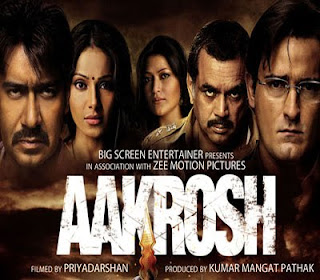Aakrosh (New)
| Aakrosh (New) | ||
|
Three friends, one of whom is a Dalit from a Medical College in Delhi go to watch Ramleela celebrations at the Dalit’s village in Jhanjhar somewhere in the interiors of Bihar and go missing. It's two months and there is no clue about their disappearance. The media and students’ movement demand action from the authorities. It's then that the government orders a CBI enquiry with officers Sidhant Chaturvedi (Akshaye Khanna) and Pratap Kumar (Ajay Devgn) to solve the case. Sidhant is the tech savy officer always seen with the laptop who has a good profile of solving the cases and a good knack of statistical data. Pratap is the more practical no nonsense type guy who believes in getting the work done through hooks or by crook. He also has lot of connections as he belonged to a nearby village and himself a low cast Dalit.
When they reach Jhanjhar, they realize that they are not welcome there. They find it difficult to solve the case as the local police and other authorities are a part of Shool Sena, which is responsible for illicit activities. Sidhant and Pratap also face Ajatshatru Singh (Paresh Rawal), a ruthless police officer who misuses his power. Not only that even the locals don't support the investigation. It's with the help of Roshni (Amita Pathak), the daughter of a rich and powerful villager, and Geeta (Bipasha Basu), who's Aiatshatru's wife and Pratap's former love, that the investigation moves ahead. A bewildering turn of events ensue.
Priyadarshan takes his time to build the story in the first half, which is comparatively slow paced. Once that is done, you find yourself gripped. The inexorable and brooding story-telling pattern is replete with twists. The issue of honor killings is used as a backdrop, in this high octane action thriller. Mind you, the action does get gory. The violence on the Dalits at times gets exaggerated and the film is strictly not for kids. Some poignant scenes like the way the judge passes a hurried judgment as he feels claustrophobic make you cringe. The scene in which Ajatshatru Singh listens to cricket commentary while Sachin Tendulkar is batting in his 90s deserves special mention.
Arun Kumar's editing is decent but the first half could have been pruned for a much better impact. The couple of songs are a deterrent. Tirru's choreography is appealing, with some brilliant shots. Dialogues by Aditya Dhar are impactful. There's nothing great about Pritam's music.
Ajay Devgn gives a superb performance. He has an inimitable panache, which is amazing. Watch out for the scene where he narrates his tragic childhood while ironing his shirt, the dialogue delivery is impeccable. There's something between him and trains. After OUATIM, there's yet another train sequence featuring him in this film. While the former was deftly done, the latter appears farcical. Akshaye Khanna is impressive. After Deewangee, the chemistry between Ajay and Akshaye clicks even in Aakrosh. Paresh Rawal is outstanding. He may even get a Filmfare Award nomination in what is his second negative role after Rann this year. He's so good in his bad avatar that you are full of disdain each time he appears on screen. Amita Pathak is good. Bipasha Basu is miscast. It's difficult to imagine her as a tormented wife. Her two phases have a very stark contrast. Sameera Reddy is passable in the item number.
After watching Aakrosh you will feel exhausted (albeit in a good way!) but please be aware of the excessive violence depicted which puts the gloss off an otherwise superb action thriller!

